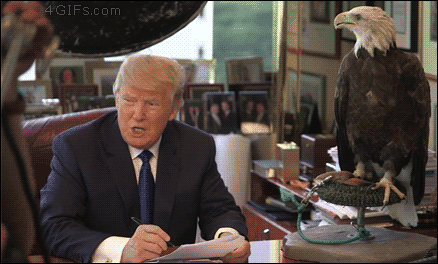Donald Trump, who’s cheating on his third wife with a veal parm, doesn’t really want to win the Republican nomination, but he also doesn’t want to not win it. That would be a loss.
The most important matter at hand isn’t whether Beefsteak Charlie is really in it for good, but rather that he’s appealed to the worst of us, stoked vile hatred that will survive him. When Trump supporters tell you that they’re tired of being forced to be politically correct, what they really mean is they feel like they can’t say racist things without retribution anymore, something that once was possible.
Adding to the fury is the seismic financial and demographic shifts that the former white working class is enduring. That economic decline is the result of many factors, among them the tax codes instituted by those GOP pols who claimed to champion them. They’ve been let down, and now with Trump’s assistance they’ll let loose, and many who are not to blame will be blamed.
From Anand Giridharadas at the New York Times:
About half of Trump supporters in North Carolina and in New Hampshire want to “see the mosques in the country shut down.” In the North Carolina poll, only one-quarter of Trump supporters said they thought Islam should even be legal in the United States; 44 percent thought not.
This suggests that there is an enormous constituency favoring this set of (probably unconstitutional) ideas, despite the fact that they have been rejected by most of the American political class. Trump didn’t generate this constituency with a few brash statements. He harnessed feelings that long predated his candidacy — feelings of besiegement and alienation, of being silenced — and gave them an unprecedented respectability. Even if Trump leaves the stage by springtime, he has galvanized, gathered and given voice to all these Americans.
America is living through an era of dramatic changes: its demographics shifting, its middle class contracting, its institutions grappling with the pressures of the networked age. Trump isn’t winning those Americans who tend to experience this change as a tailwind. But he has enthralled millions who experience it as a headwind, and his relentless campaign against “political correctness” has given voice to their fears: about terrorism; about a country passing into new hands, with the attendant loss of privileges and certainties; about a democracy that will never solve problems if we cannot call radical Islam radical Islam. This anti-P.C. sentiment, so vital to Trump’s brand, is often minimized on the left as simple intolerance. But the longing for less-muzzled debates is to many on the right what campaign finance is to many on the left: the issue we must solve to be able to solve any other issue.
This is how Trumpism might outlast Trump — by gelling this anxiety and longing into a movement, by giving a new permission to question who is American, by redrawing the borders of respectable debate.•



